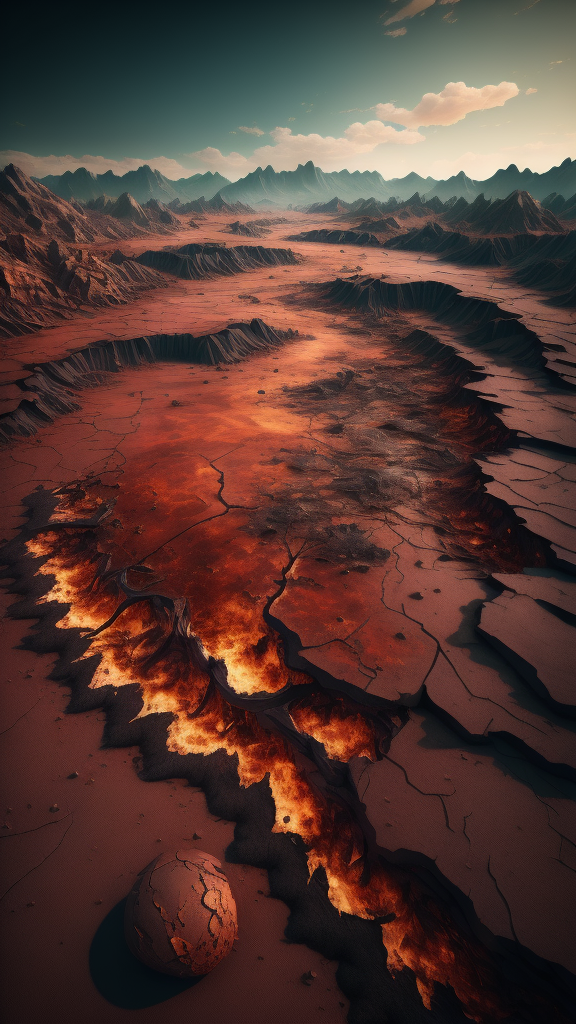
The heatwave was relentless. Day after day, the mercury climbed higher, and the small village of Ashford, nestled in the English countryside, baked under an unforgiving sun.
The first day seemed like any other hot summer day, albeit more intense. The villagers carried on with their routines, albeit more sluggishly. Children played in the sprinklers, and elderly residents took shelter in the shade.
Mark noticed that the sunlight felt harsher on his skin, as if it were piercing through him. Reports on the news hinted at unusual solar activity, but no one took it seriously.
By the evening, however, the heat persisted, with the temperature barely dropping. People tossed and turned in their beds, unable to find relief.
The sun rose early, bringing with it an oppressive heat. The temperature had risen even higher, and the normally busy streets were eerily quiet. Mark noticed the leaves on the trees beginning to wilt, and the grass in the village green turning brown.
The news reported spikes in heat-related illnesses, and the local hospital was overwhelmed. The phrase “ozone depletion” began circulating, but the government assured everyone it was under control.
Mark’s neighbour, Mrs. Thatcher, fainted in her garden while watering her plants. It was the first sign that this was not a typical heatwave.
By the third day, the reality of the situation began to set in. The power grid started to falter under the increased demand for air conditioning and refrigeration. Short, sporadic power cuts left villagers in sweltering heat. The once-refreshing showers now spewed tepid water.
Mark tried to reach his brother in London, but the phone lines were down. Panic began to spread as people realised they might be facing more than just an unusually hot summer.
The village shop ran out of bottled water and fans, and tempers flared as people fought over the remaining supplies.
The fourth day was unbearable. The power cuts became more frequent, plunging the village into stifling darkness. The sun blazed in a cloudless sky, and stepping outside felt like entering an oven. Mark’s dog, Charlie, refused to leave the cool tile floor of the kitchen.
News reports grew more dire, with scientists confirming that the ozone layer had drastically thinned, allowing deadly ultraviolet rays to penetrate the atmosphere.
Hospitals were overflowing, and emergency services were stretched thin. Mark saw his neighbour’s children crying, their skin reddened from sunburn despite staying indoors.
Anxiety turned to dread as villagers realised this was not just a local crisis—it was global.
On the fifth day, power cuts began. The village’s old infrastructure couldn’t keep up with the demand. Without fans or air conditioning, the heat inside homes became unbearable.
That night, Mark heard screams from his neighbour’s cottage. Rushing over, he found the family unconscious, their faces twisted in pain. They were rushed to the local surgery, but it was too late. They were the first casualties.
People began to leave, but the motorways were clogged with cars overheating and breaking down. The village was becoming a death trap. Those who stayed tried to ration water, but it evaporated almost as quickly as it was poured. The once-bustling village green was now a ghostly furnace.
The government issued desperate warnings and instructions, but there was little that could be done. Scientists had predicted the slow decline of the ozone layer, but this rapid depletion was beyond anyone’s control. The sun’s rays grew ever more intense, and temperatures continued to rise.
In a final, desperate bid for survival, Mark and a small group of villagers sought refuge in the ancient stone church, its thick walls offering the only semblance of protection.
But even there, the heat seeped in, and the air became stifling. They listened to the radio until it went silent, signalling the collapse of society as communications failed and the world outside burned.
Days turned into weeks, and the relentless heatwave showed no signs of abating. The global temperature had risen to an uninhabitable level, and reports of mass extinctions flooded in before all news ceased. The human race was on the brink of annihilation.
One evening, as Mark lay on the cool stone floor of the church, he looked through the small, stained-glass window at the blazing sun. He realised with a cold clarity that this was the end.
The depletion of the ozone had unleashed a wrath no one could survive. The Earth was reclaiming itself, purging the species that had caused its destruction.
In the end, nothing was left but a charred landscape, the sun setting behind a horizon of smoke. The human race had been wiped out, leaving behind only the haunting memory of a world that once was.
The Earth, now a barren wasteland, continued its silent orbit around the sun, bearing witness to the final consequence of mankind’s hubris.

